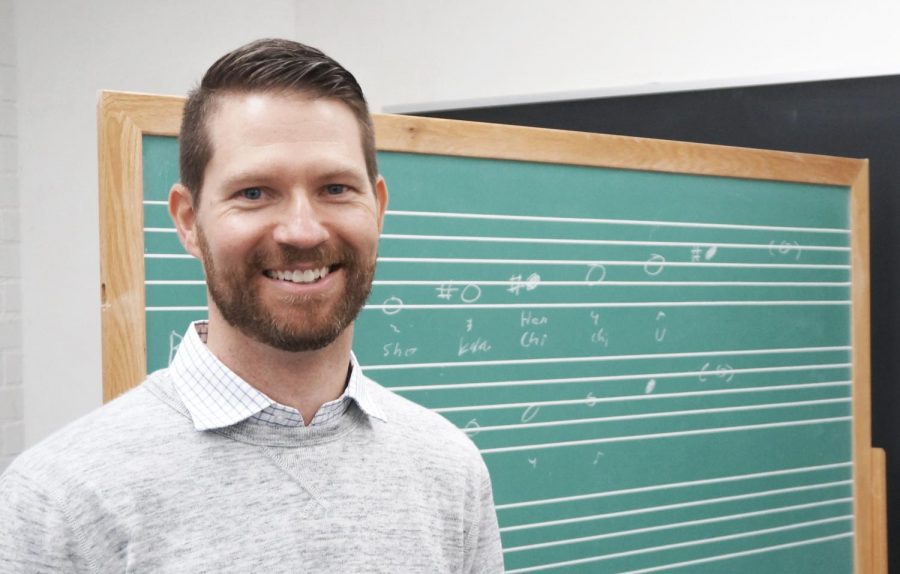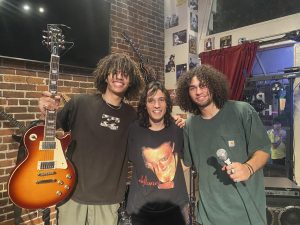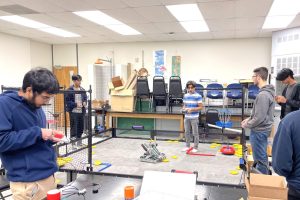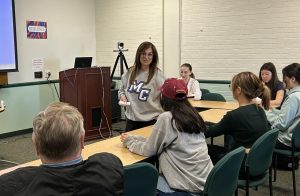Will artificial intelligence be the next Juke Box hero?
Moorpark music technology professor Nathan Bowen standing in the music technology classroom at Moorpark College. He discussed the use of AI in the classroom, and in music creation projects.
August 23, 2017
When the team at Sony’s Flow Machines research project fed 15,000 sheets of music into a computer, and heard the speakers come alive with the sound of a Beatles-esque pop song, they knew it was a breakthrough. Artificial Intelligence (AI) had just crunched the melodies and harmonies from some of the greatest hit songs ever written, and then churned out a tune of its own.
After a 5-year project that started in 2012, Flow Machines is expected to surpass its current milestones and release an AI pop music album in 2017.
Francois Pachet, the director of Sony’s Computer Science Lab and the Flow Machines project, said that AI will be able to take us beyond what we are hearing now.
“AI will spark innovation at several ‘dimensions’ of music: melody and harmony, which, arguably are now very poor in mainstream music,” said Pachet. “And also new sounds and combinations of sounds, unusual combinations of styles, that humans would not have thought of without those techniques.”
Industry analysts and AI developers say all indications are that AI will help humans create music, and that it will learn to create music on its own. It is also likely that this music will be heard on the radio, TV, movies, commercials, and on the Internet.
According to some experts, AI will also introduce novel teaching tools for music education. But some experts say that the advancements come at a price, because AI will automate and take away paid work from professional composers and songwriters.
HEARING IS BELIEVING
Aditya Kaul, a research director at the AI focused research firm Tracticapredicted how AI is going to influence the music industry.
“AI music will be used for commercial purposes such as giving the background score for ads, videos, TV, films etc.,” said Kaul. “In the long run, you are very likely to see AI music being sold commercially and possibly getting onto the charts.”
Kaul also sees AI’s potential for expansion in music education.
“Creative education is likely to flourish, as most of the low-level jobs will become automated,” said Kaul.
Anthony Wardzinski, a music professor at Moorpark College, hypothesizes that AI would be useful for teaching music.
“I imagine the commercial applications may be pretty significant, but if you’re really looking for high artistry, you would want to teach students how to judge the finer points of music and really make more aesthetic judgments on the music, and how, if they’re using the AI…that they’re ultimately in charge and they can fine tune it,” said Wardzinski. “AI could give students imperfect models, and then ask them ‘How could this be improved?’”
Nathan Bowen, a music technology professor at Moorpark College, is excited about being able to use AI as a tool for music creation and education.
“Say I have a C major scale, but I want the computer to randomly choose which note I play in that key, then that would be an example of artificial intelligence, because I’m endowing the computer to make some choices that I don’t want to make,” said Bowen. “I want to see what happens when that computer does that…Frequently, it’s a surprising thing.”
Timothy Salazar, a Music major at Moorpark College, feels that AI will be useful in the classroom, but it won’t be able to “capture that emotion” that people might want to hear or experience.
“A lot of what we do right now is trying to learn how to draw similarities from different eras, to learn more about why things are written the way they are,” said Salazar. “So getting us something that shows us how to analyze that could be so beneficial for us, but it would never replace the human mind.”
THE OTHER SIDE OF THE STORY
There are potential challenges for people considering a career in music creation: Whether a music publisher needs formulaic hit songs, a Youtube content creator that can’t afford to license music, or an advertising agency that doesn’t have the budget for a composer, AI may be more than sufficient.
Tractica’s Kaul confirmed paid work is already being diverted to AI.
“AI music companies like Jukedeck and Amper are already going after the low hanging fruit, like Youtube content, where people can’t afford to pay or license.”
Michael Carey, an award-winning composer, hit songwriter, and producer, has had a prolific 25-year music career, and witnessed the evolution of the music business. He is wary of AI.
“It will be a major step toward the already significant trend of commoditizing creative content,” said Carey. “AI-based music creation will hasten the ‘race-to-the-bottom’ as music is increasingly de-valued.”
While AI may be feared by some, ultimately AI will become a new kind of creative partner, providing musicians with a toolkit that will help them reach beyond existing frontiers in music. According to Pachet, the sky is the limit.
“We are investigating how machine-learning techniques can be used to boost creativity, to trigger novel ideas, and to accelerate the development of musical ideas,” said Pachet. “Pedagogy will surely make use of these techniques, eventually.”








